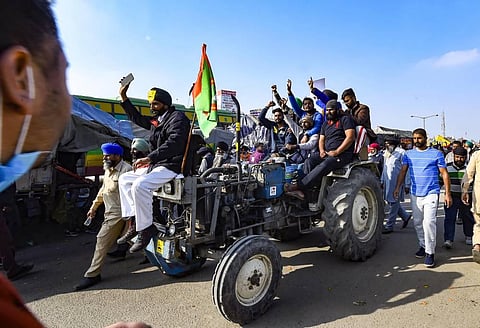

NEW DELHI: It's been over two weeks since thousands of farmers arrived at Delhi's Singhu border to demand a repeal of the Centre's agri reforms.
Over the days, Good Samaritans, gurdwara committees and NGOs have pooled technological resources to ensure the agitation isn't hampered by the lack of basic amenities.
Gigantic machines that belt out 1,000-1,200 chapattis in an hour, washing machines and solar panels installed on tractor-trolleys for charging mobile phones -- technology is keeping the protesters camping at this highway-turned-township going.
The chapatti-makers ensure timely meals for the protesters and that 'langar' is served smoothly till midnight.
"This chapatti-making machine is fully automatic, you just have to put the dough inside. It cuts the dough into circles and in no time you get the chapattis."
"We start the machine around 7 am and it runs till 12 am. We serve meals to over 5,000 people every day," Hardeep Singh from Delhi Sikh Gurdwara Management Committee, which manages one of the 'langars' at the protest site, told PTI.
Living away from the comfort of their homes, another issue faced by the farmers was washing clothes.
Initially, some of them bathed and washed their clothes at petrol pumps.
But as the temperatures in the national capital dipped and the number of protesters swelled, some farmers and Good Samaritans arranged for washing machines.
On one of his trips back home to Ludhiana in Punjab to wash his clothes, 30-year-old Prince Sandhu decided to bring two washing machines with him so that he and his fellow protesters didn't have to worry about the chore.
Soon after, someone donated another washing machine and the 'laundry sewa' has been going on in full swing ever since.
"Nearly 250 people come here every day to wash their clothes. Many do it on their own. We help out the elderly who don't know how to operate washing machines," said Sandhu, who joined the protest on November 27.
"I wake up at 6 am and help people wash their clothes till 8 pm," he said.
Not far from the laundry spot is Pushpinder Singh's phone charging station.
Singh, 36, said he knew protesters would face problems in charging their mobile phones and hence decided to install two 100 watt solar panels atop his tractor trolley before he set out from home in Haryana's Karnal.
"Mobile phones are our only source of knowing what is happening around us. I knew charging them would be a problem. So I bought these two solar panels for Rs 2,400 each before I got here. Not only are they helping us in charging mobile phones but also with lighting," he said.
"Now I see many others have also installed solar panels, which is good," he added.
Earlier, international NGO Khalsa Aid made headlines for installing foot massagers and geysers for the protesters at Singhu border.
Thousands of farmers, mostly from Delhi's neighbouring Punjab and Haryana, have stayed put at the national capital's border points since late November to protest against the new farm laws.
Enacted in September, the three farm laws have been projected by the government as major reforms in the agriculture sector that will remove the middlemen and allow farmers to sell their produce anywhere in the country.
However, the protesting farmers have expressed apprehension that the new laws would pave the way for eliminating the safety cushion of Minimum Support Price (MSP) and do away with mandis that ensure income, leaving them at the mercy of big corporates.